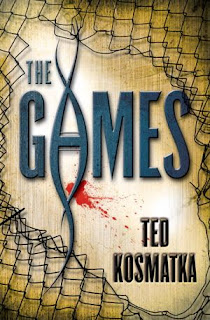 of the year: the Hugo, the Nebula, and the John W. Campbell Memorial Award.
of the year: the Hugo, the Nebula, and the John W. Campbell Memorial Award.He applied the Page 69 Test to his latest novel, Triggers, and reported the following:
From page 69:Learn more about the book and author at Robert J. Sawyer's website and blog.the president, it was the FBI that investigated attacks on him. But the two FBI agents dispatched to Danbury's home had asked Cheung to join them, since he'd been familiar with the deceased. Gordo lived an hour's drive southwest of DC, in Fredericksburg, Virginia -- far enough away that his place hadn't been affected by the electromagnetic pulse.Triggers is my 21st novel, and the first new one I've written since FlashForward, the ABC TV series based on my novel of the same name, went off the air. That series brought me more new readers than anything else in my career. My original FlashForward novel was a philosophical exploration of fate and free will, but ABC made it into a slam-bang conspiracy-theory thriller (with my blessing and participation -- I wrote one of the episodes and consulted on all of them).
It didn't take long to find what they were looking for. Danbury had an old Gateway desktop computer, with a squarish matte-finish LCD monitor, an aspect ratio that was hard to get these days; both were connected to a UPS box. He'd left them on, with a Microsoft Word document open on the screen. The document said:Mom,Cheung glanced around; there was no sign of a printer. "He expected to die today," he said. "And he knew we'd find this."
You'll never understand why I did this, I know, but it was the right thing. They won't let me get away, but that doesn't matter. I'm in heaven now, receiving my reward.
Praise be to God.
The FBI agents were both white, but one was stocky and the other thin. The stocky one said, "But he ran."
"If he hadn't, he'd have been gunned down," said Cheung. "Sure, Gordo was a sharpshooter, but he'd have been facing a swarm of armed Secret Service agents; they'd have had no trouble taking him out, and he had to know that. Once he shot the president, he knew he'd be neutralized."
"Did you know he was religious?" asked the thin FBI man, whose name was Smith, as he pointed at the glowing words.
"No," said Cheung. "Never heard him mention it."
"`Praise be to God,'" Smith said. "Odd way to phrase it."
Cheung frowned, then gestured at the computer. "May I?"
"Just a minute," said the heavier agent, Kranz. He took a series of photos of the computer as they'd found it, and dusted the keyboard for
Because of the big new influx of readers who associate me more with thriller than science fiction, I decided to make Triggers a novel that might please both audiences: the readers who have been with me for years, and the new ones. Page 69 gives a good sense of some of the thriller elements in Triggers: an attempted assassination of the president, a conspiracy in the Secret Service, and more.
What's missing from it is anything science fictional, but, trust me, that's in there, too (indeed, the novel was serialized prior to book publication in Analog, the world's #1 bestselling English-language science-fiction magazine), although the whole thing should be readily accessible to people who don't normally read science fiction.
--Marshal Zeringue





























